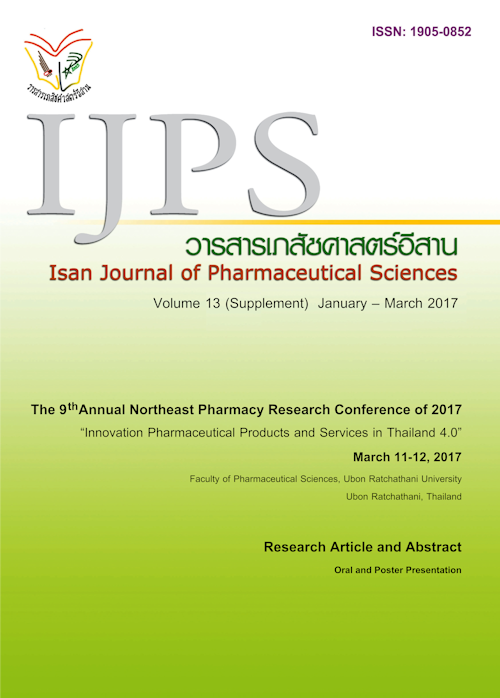Implementation of Ethical Criteria for Pharmaceutical Purchasing and Sales Promotion of Drug and Non-drug Supplies 2014 in Hospitals: Case Study at a Province of Northeastern Region
Main Article Content
Abstract
Introduction: The purposes of the study were to examine the method and barriers in implementation of ethical criteria for pharmaceutical purchasing and sales promotion of drug and non-drug supplies 2014 in public hospitals. Methods: Qualitative study, the purposive sampling technique was used to select informants and collected from semi-structures interview. There were 17 pharmacists who are the secretary of the Pharmacy and Therapeutic Committee (PTC) in hospitals. The data was collected between October and November 2016. Results: Implementation: Most of the hospitals (16 hospitals) have the codes of practice on ethical criteria except one hospital because the hospital follows the regulations of the Office of the Prime Minister on Procurement B.E. 2535. Monitoring: regulated and enforced by the PTC found that the hospitals have the drug and non-drug selecting systems, prescribing system using generic names, and policies that associated with cost-effectiveness and patients{ safety. However, there was no record on any pharmaceutical company{s sponsorship either the forms of material support or financial support to the health care providers through the hospital regulating system. Barriers to implementing the codes of practice is the strength of the PTC, relationship between healthcare professionals and pharmaceutical industries, hospital budgets, and practitioner ethics. Conclusion: This study found that most hospitals have the codes of practice on ethical criteria but lack of monitoring, regulation, and enforcement system. Hospitals must have internal and external audit system. Set up reward rules for practitioners who implement the codes to be a model of the organization.
Article Details
In the case that some parts are used by others The author must Confirm that obtaining permission to use some of the original authors. And must attach evidence That the permission has been included
References
Jamniandumrongkarn S, Chaisumritchoke ST. (Ed.). Drug Watch Newletter. Thai Drug Watch Project. Faculty of Pharmaceutical Sciences, Chulalongkorn University. 6(24). Dec, 2014.
Lexchin J. Interactions between physicians and the pharmaceutical industry: What does the literature say?. CAN MED ASSOC J1993; 149 (10): 1401-1407.
National Health Assembly. The 2nd National Health Assembly resolution on the prohibition of unethical medicinal drug promotion. (Dec 18, 2009).
Norris P, Herxheimer A, Lexchin J, Mansfield P. Drug promotion: what we know and what we have yet to learn. Geneva: World Health Organization and Health Action International; 2005.
Office of the Permanent Secretary. Ethical Criteria for Pharmaceutical Purchasing and Sales Promotion of Drug and Non-drug Supplies 2014. Notification of the Ministry of Public Health. (Oct 30, 2014).
Palasin K. The stakeholders' opinions towards Code of Pharmaceutical Promotion in Thailand. [An Independent Study Report for The Master of Pharmacy in Pharmacy Management]. Khon Kaen: Khon Kaen University; 2014.
Sirisorn W, Ploylearmsang C, Waleekhachonloet O. Role of Pharmacy and Therapeutic Committee and Generic Drug Use Policy in Perspective of Medical Personnel in a Tertiary Hospital, Thailand. J Sci Technol MSU 2013: 793-802.
Vatjanapukka V. Drugs and promotions: basic arguments on their controversial areas. Chula Med J 2011 JanpFeb; 55 (1): 1-8.
Wadkhian S, Lohawech N, Jabthalay S, Chaichalermpong W, Kessomboon P. Medical Representatives’ Promotional Activities to the Resident Doctors in a Medical college. IJPS 2012 Jan-Apr; 8 (1): 10-19.
World Health Organization. Ethical criteria for medicinal drug promotion. Geneva: WHO; 1988.


